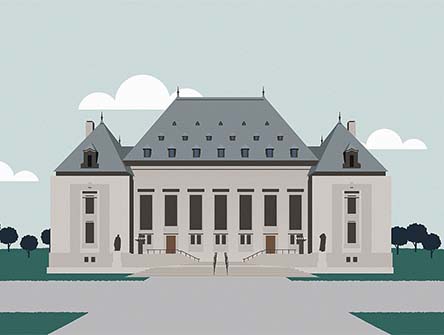So you want to be a judge?
Four members of the bench answer the questions you need to ask before making your move.

While many lawyers consider a judicial appointment to be the pinnacle of a legal career, there is no field guide for those who aspire to the bench. There are no preparatory courses. Judicial education only begins in earnest after the call has come.
How do you know, then, if you have what it takes to get there? To help lawyers who are considering applying for a judgeship — and to ease the transition for those new to the bench — National turned to four prominent members of the judiciary for advice.
With wit and wisdom, Chief Justice François Rolland of the Superior Court of Quebec, Mr. Justice R. Dennis Maher of the Court of Queen’s Bench of Saskatchewan, Madam Justice Michelle Fuerst of the Superior Court of Justice for Ontario and Chief Provincial Court Judge John R. A. Douglas of Prince Edward Island talked about (almost) everything you always wanted to know about becoming a judge, but were afraid to ask.
Do you really want it because “there’s no looking back”
Most legal jurisdictions in Canada require 10 years’ experience as a basic minimum requirement. Typically, however, successful applicants have at least 20 years under their belt, says Chief Justice Rolland.
“One of the things I think is important for lawyers who have in mind that perhaps someday they would like to apply to be a judge is not to do it too soon,” says Justice Fuerst.
“Absent a real depth of experience within the legal profession and absent some real life experience, I think you lack some of the necessary foundation.
“I also think it’s important to be at a place in your career where you’re not going to have any regrets, that maybe if I had stayed at the bar another five years . . . I would have had a chance to do some really interesting work that now I will never have a chance to do because, with very few exceptions, once you go to the bench, there’s no looking back.”
Sure you’re a brilliant lawyer, but are you empathetic?
Beyond screening for professional excellence, a strong work ethic and prodigious legal skills, Ontario’s judicial appointments advisory committee notes on its website that successful applicants should display compassion, empathy “and an interest in knowing about the social problems that give rise to cases coming before the courts.”
Justice Maher suggests that pro bono work is an excellent way for lawyers to gain valuable insights and compassion for those who face hardship in their lives.
One of the judges who joined our court came from a large firm that did a lot of corporate commercial. At the same time, he started to work with what we call child and family services in Saskatchewan. He told me over lunch one day, ‘You know, I didn’t know that world existed,’” he recounts.
“There are various strata of society that we end up dealing with. The more experience you get to see the diversity makes you a better person to start with. And if you end up on the bench, it helps you in that regard,” Justice Maher says.
The National Judicial Institute helps in this regard, as well, with its continuing education programs for judges, says Chief Justice Rolland.
“You want to become a better judge. You want to understand what it is to judge in a diverse society, what it is not to have biases, how you can judge without having stereotypes.”
Will sharp practice come back to haunt you?
Applicants for judicial appointments are asked to provide several references. But selection committees routinely go off-list, and talk to people who cannot necessarily be counted on to put in a friendly word. The committee will talk to colleagues, judges the applicant has appeared before, even opposing counsel, to get a handle on a candidate’s comportment and interpersonal skills.
“Oh, it pays to be civil,” says Judge Douglas, adding that “it’s more important for your day-to-day life than hoping to get an appointment or something.
“If you get along with all your lawyers and you have a reputation for fairness, you’re more likely to receive fair treatment from the other side. We all get caught from time to time and need a favour...
“Those who engage in sharp practice are going to be a lot less likely to get a break from the court or from their colleagues.”
Are you involved with your profession and community?
Chief Justice Rolland, Justice Fuerst, Justice Maher and Judge Douglas were all what the Chief Justice describes as “CBA junkies” before their respective appointments to the bench. Now they are all actively engaged in various judicial education initiatives.
“If you have been very involved in the Canadian Bar Association or law societies and if you have a history of upgrading yourself . . . it will show that you are actively keeping up,” Judge Douglas says.
“Chair of the ethics committee, as an example, is something you [as a member of an advisory committee] would look at and say, ‘Well they must have a lot of confidence in you and your integrity to put you in as chair of the ethics committee.’”
Reputation in the broader community also carries weight in the selection process, according to the Office of the Commissioner for Federal Judicial Affairs Canada.
Chief Justice Rolland elaborates: “If you have never been involved in the community and are isolated in your own world, if you are doing your job as a lawyer, but we don’t see you, we don’t hear you, will that person be willing to serve the public?
“You have to be known by the community and to be known, obviously, positively.”
Can you handle the workload and pressure?
“This is always the first reaction of new judges after six months or a year: I didn’t know it was that much work, that much stress,” says Chief Justice Rolland.
“A judge must decide, a lawyer must convince — and it’s easier to convince than decide . . .
“When you render a judgment, clearly you will disappoint at least one party. You may do a very good job, but it’s not a job where you are going to be popular,” Chief Justice Rolland says.
“I always tell the new appointees it is the only job where everything you do is public. The hearings are public, the judgment is public. We used to say for medical malpractice, the surgeon is burying his errors, but the judges are publishing their errors.”
Of course, you do your utmost to avoid making errors, he adds.
How do you deal with the prospect of appeal?
All four judges who talked to National are of like mind: do your best, and don’t stress too much about the prospect of appeal. It’s an essential part of the judicial process.
“Experienced judges tell you that you cannot decide cases looking over your shoulder at what the court of appeal might do two or three years down the road,” says Justice Fuerst.
“When you are writing your decision, it’s not with the view of ‘how can I prevent an appeal.’ It’s to make sure your reasons, your logic are set out clearly and adequately enough that they can be properly be reviewed at an appeal court,” says Judge Douglas. “Some people talk about appeal-proofing their judgments. Well, I think that’s the wrong approach.”
“When you decide a case, you decide with the evidence that is adduced before you and with the law as it exists . . . Your goal is to render the best possible decision,” says Chief Justice Rolland. “If the court of appeal says that decision should not have been rendered that way, well, so be it.”
What’s important, ultimately, is that the most just decision has been arrived at, says Justice Maher, “so the court of appeal provides a level of comfort.”
Are you self-disciplined?
The ability to manage time and a heavy workload — and “the capacity to handle stress and the pressures of the isolation of the judicial role” — form part of the assessment criteria established by the Office of the Commissioner for Federal Judicial Affairs.
But, once they are appointed, judges are not left totally on their own to deal with the pressures of the job. The
National Judicial Institute offers courses on stress management and time management.
In fact, there are all sorts of programs to help new judges navigate the early years on the bench, says Judge Douglas.
“But the best resource you will have will be your fellow judges on the bench. Your chief judge, or the judge down the hall, is where you’ll be turning to for most of your advice in the early days.”
Justice Maher says Supreme Court of Canada Chief Justice Beverley McLachlin, chair of the board of the National Judicial Institute, told him early in his career on the bench that it’s important for judges to “take time to think — I have never forgotten that.”
Justice Fuerst says judges also need to build writing time into their schedules to avoid getting snowed under. “When I was a young lawyer, it wasn’t all that unusual for a judge to give a decision in a criminal case with two or three lines of explanation in a busy court. But times have changed. We are now expected — and rightly so — to explain our decision to the litigants and to the public at large. It’s not a quick and easy process by any means.”
With time at a premium, judges are also taking a far more active role in case management, says Chief Justice Rolland. “Instead of saying we are going to hear these cases whenever the lawyers are ready, now we are saying no, no, no, no. If you file a case, this case will proceed in a timely fashion.”
In private practice, lawyers have the option of hiring more staff to handle the workload. Judges work with the resources their court has been allocated.
Therefore, self-discipline and good work habits are essential, says Justice Maher, who takes a matter-of-fact approach. “Time is how you manage it.”
Are you willing to keep learning?
“That’s another quality for someone who aspires to be a judge: the willingness to learn new things. If you say, ‘I don’t want to go and sit on a school bench anymore,’ well don’t think of becoming a judge, because it’s a constant learning process. You want to perfect yourself,” says Chief Justice Rolland.
The Federation of Law Societies of Canada offers an annual program on criminal law and a program on family law every two years, says Justice Fuerst, who is co-chair of the criminal law program. Both programs are popular with judges.
The National Judicial Institute offers a broad suite of programs to keep judges up to date. There are courses on new developments in science and technology, judicial independence, judgment writing, effective communication, how to deal with the self-represented in court, and all aspects of the law for judges who may have concentrated exclusively on one area of the law being appointed to the bench.
“A lot of lawyers practise in areas that are so specialized now that they become very, very focused,” says Stéphane Émard-Chabot, education director at the NJI. “If you are doing tax law, for instance, the chance of coming across a Charter case are pretty slim, so there are a lot of components on the Charter.”
“You have to look at the big picture because of where you are now.”
How do you know whether you really are suited?
“You probably won’t until you are there,” says Judge Douglas.
“Do you have trouble making decisions? Well just because you may be a little wishy-washy in personal affairs doesn’t mean it necessarily follows you to the bench.
“When I was appointed, my youngest daughter was six or seven. I was off getting my picture taken or something, and her mother was driving her to soccer. She was trying to explain to our daughter about my new job and what it entailed.
And my young one said, ‘Well, Mum, how can Dad send people to jail when he can’t even send me to my room?”
The judges:
Chief Justice François Rolland
François Rolland was named to the Superior Court of Quebec in 1996, and appointed Chief Justice in 2004. He was a founding member of the CBA’s Canadian Judges’ Forum, and served as its chair from 2001 to 2002. From 1989 to 1990, he served as the president of the Quebec Branch of the CBA.
Madam Justice Michelle Fuerst
Prior to her appointment to the Superior Court of Justice in 2002, Michelle Fuerst practised exclusively in criminal and quasi-criminal litigation with the Toronto firm of Gold & Fuerst. At the time of her appointment, she was the president of the Criminal Lawyers’ Association. She is a past president of the Ontario Bar Association (formerly CBAO).
Mr. Justice R. Dennis Maher
R. Dennis Maher, Q.C., of North Battleford, was appointed a Judge of the Court of Queen’s Bench of Saskatchewan in Prince Albert in 1998. He was elected a Bencher of the Law Society of Saskatchewan in 1997 and has held many positions in the Saskatchewan Branch of the Canadian Bar Association as well as the national organization.
Chief Provincial Court Judge John R. A. Douglas
John R.A. Douglas was appointed to the Provincial Court of PEI in 1997 and named Chief Judge in August 2000. Prior to being appointed to the bench, he was a partner with the law firm of Patterson, Palmer, Hunt and Murphy.

